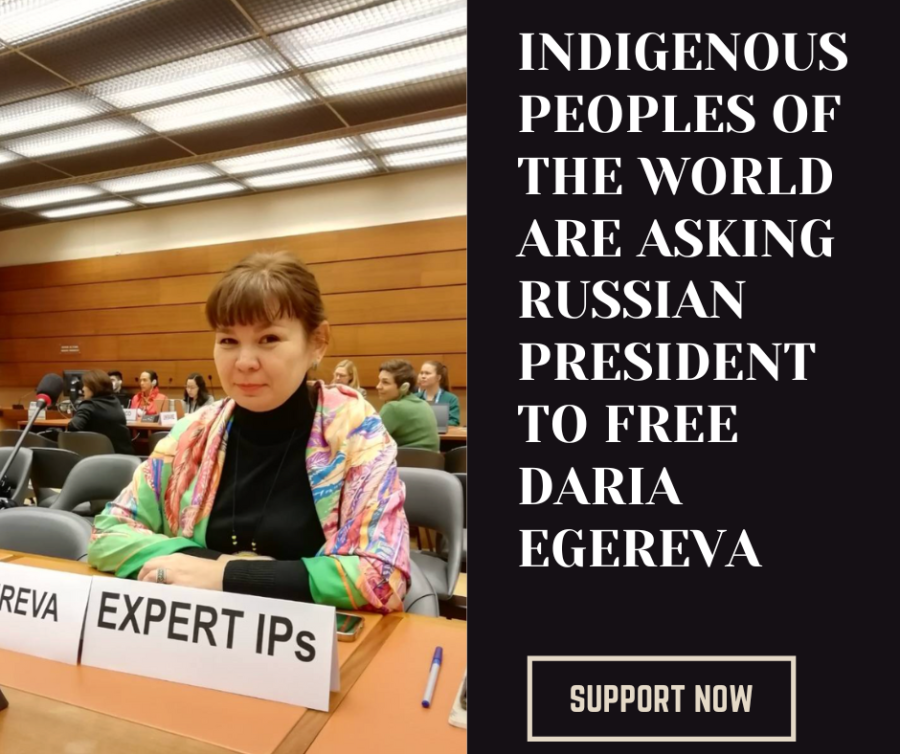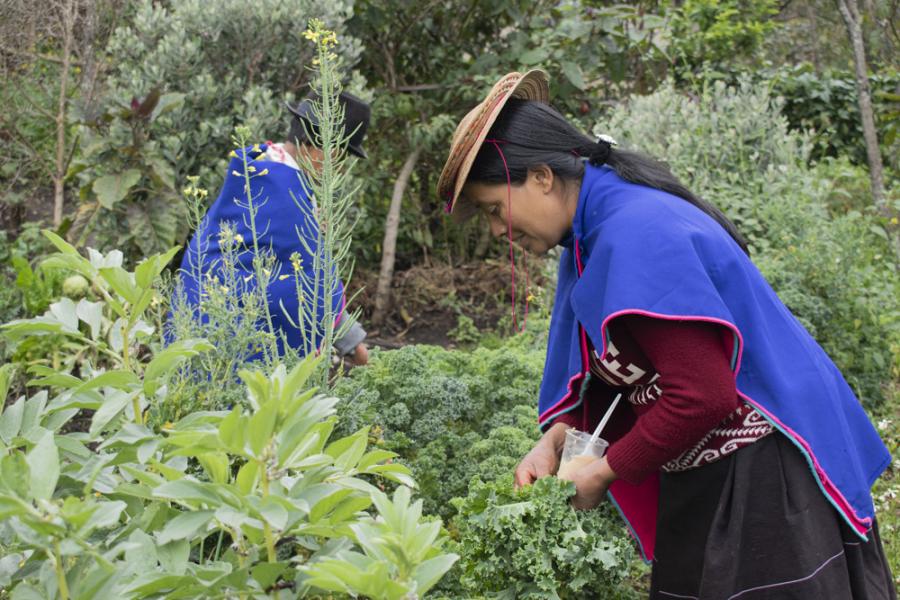
By Nati Garcia (Maya Mam, CS Staff)
All around the globe, Indigenous women are risking their lives honoring the legacy of their ancestors in protecting the livelihoods, cultures, languages, and ecosystems that we are innately interconnected to, our only home: the Earth. Today, on September 5, on International Indigenous Women's Day, we commemorate the heroic spirit of the Aymara warrior Bartolina Sisa, who, in 1780, opposed colonial assimilation and guided Aymara warriors to justice in the face of exploitation. Her spirit is felt to this day, inspiring young Indigenous women to continue to fight for justice and reminding us to stay true to our warrior spirit, to take action in calling on the colonial systems for accountability.
We want to make a special tribute to Sisa by inviting all warrior spirits to take a moment in your day today to hold space for your ancestors through art, music, dance, writing, or any other actions that resonate with you and your culture to mark this day for justice and awareness for Indigenous women’s leadership, and also to honor the Indigenous women leaders who have left their spirits in our hearts and memory.
Indigenous women have long been marginalized and continue to face multiple forms of discrimination based on ethnicity, gender, economic, political, or societal status, disability, and location. However, Indigenous women are the ones who carry millennia-old Traditional Knowledge about the land and biodiversity that is embedded in their cultures and languages. It is this knowledge, which has been passed down from one generation to the next, that makes Indigenous women the original storytellers, the keepers of their traditions and oral history, natural community leaders, and the best experts of their own lands. Indigenous women are also leaders in the global Indigenous Peoples’ movement and the women’s movement.
For many years, Cultural Survival has prioritized projects that center women and engage women’s and girls’ leadership, and we continue working to uplift Indigenous women according to Indigenous values and protocols self-determined by Indigenous communities. Since 2016 we have organized over 25 workshops building Indigenous women’s leadership on issues related to defense of human rights, land defense, technical communication skills, radio production, and more in Central America, Mexico, Bolivia, and Nepal. We strive to support Indigenous women in being the decision-makers and protagonists of their own stories and taking the leadership and participation roles that they choose and deserve.
As part of our Indigenous Youth Fellowship Program, we celebrate three young Indigenous women who have been pillars to their community and agents of change for the next generation. Our youth fellowship program supports young Indigenous leaders between the ages of 17-28 who are eager to learn about technology, program development, journalism, community radio, media, and Indigenous Peoples’ rights advocacy. Since 2018, we have awarded 137 fellowships supporting 191 young Indigenous women. Below are the stories of three inspiring young Indigenous women who strived to make their dreams a reality.
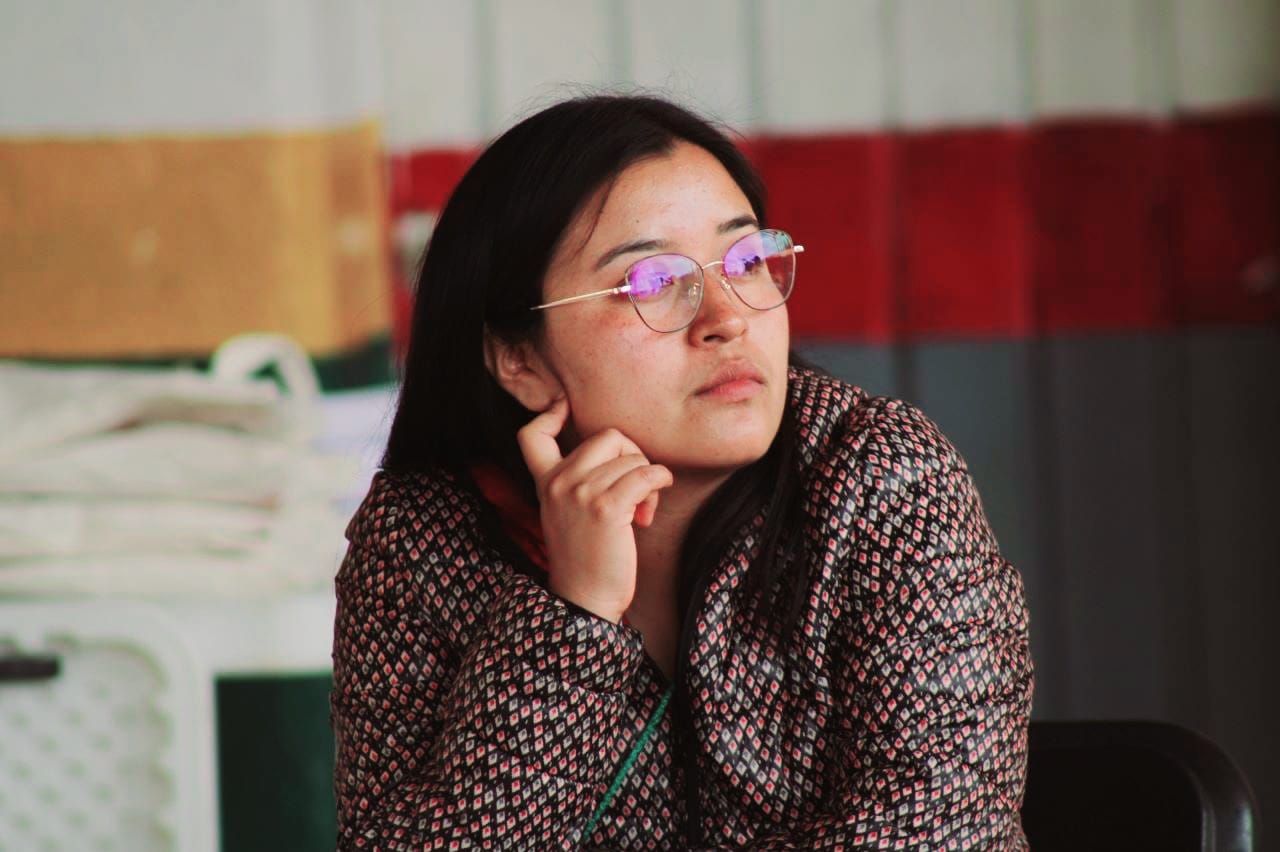
Saraí Jiménez Orozco (Mixe) is a speaker of Ayöök (Ayuuk) from Oaxaca, Mexico. She holds a degree in Administration and Sustainable Development from the Instituto Superior Intercultural Ayuuk A.C. of the State of Oaxaca in Jaltepec de Candayoc Mixe, where she also taught Ayuuk. She was part of the postgraduate program of the University of Deusto Spain in Human Rights in 2022, and currently collaborates with Servicios del Pueblo Mixe in the Department of Gender and Mixe Women. She has been actively promoting the revitalization of the Ayöök language and closing the intergenerational gap by teaching Ayöök to children in schools.
As part of her fellowship project, “Atëëmt” (Seed of the Word), awarded in 2023, Jiménez delivered capacity building workshops to children on strengthening the Ayöök language and documented their experiences in Ayöök and Spanish for the creation of an e-book with their illustrations. The workshops aimed to create a sense of belonging for the children and connection to their identity so that they, as well as other Mixe people, could see the positive side of Ayöök, and not only what is portrayed negatively in the media or from the outside. They collectively expressed how they live the language in their daily lives, and in this process they discovered the importance of continuing to speak Ayöök. “A living language without written grammar is better than a dead language with thousands of grammars,” says writer and linguist Yasnaya Aguilar (Ayutla Mixe). Aguilar is a member of the Mixe Collective, which develops materials, books, and illustrations for early readers of Ayöök language.
Jiménez has dedicated her efforts in safeguarding the passage of the Ayöök language to the next generation and has been a primary agent in advocating for children’s education. “I think it is very important to pay attention to children, because a lot of things depend on them for the future of a community,” she says. Her natural leadership comes from the legacy of struggle and resistance of her maternal line, who shaped her essence.
“One of the women I have admired the most is my mother. She has been a great leader for my community and in my family, because she has [worked on] different issues at the community level that have impacted the lives of women and girls. She is a good mediator for different processes and conflict resolution at the community level, and has promoted and organized with other women a community group called Orquídeas. This group is composed of women who have worked on agroecology, backyard gardens, native seeds, medicinal plants, transformation of local products, and the strengthening of the Ayöök language as well as demanding a life free of violence. She is one of the main traditional cooks who is involved in the different festivities that take place in our community of San Marcos Moctum. In addition, she is a cultural manager and host for cultural events. She also composes songs about the daily life of women and dances and performs plays at the community level. I have written about the work that the women from the Orquídeas do:” https://iberoforum.ibero.mx/index.php/iberoforum/article/view/279
Jiménez is from a generation of young Indigenous women breaking the cycles of hierarchy. She is driven by self-determination with the backbone of her grandmothers and shares her insights into what it means to her to be an Indigenous woman in a contemporary world: “It means to be a resilient woman; it means that we also deserve to be in all possible current spaces, whether we are talking about science, education, or any other subject. The main challenge has been the questioning of our way of living and thinking because we belong to an Indigenous community.”
Jiménez says that while issues of gender inequality from the influence of colonial systems persist, over time there has been progress in her community. Indigenous women have created community assemblies to make collective decisions on matters related to family and to hold a safe space for women to talk about their interests. This has been a tremendous achievement that Jiménez says “has helped to stop the gender violence gap at the community level and has been a great advance and empowerment of the women themselves, as they also request workshops from organizations.” The challenge the community faces is advocating for their needs to be supported. However, Jiménez is determined to advocate for the rights of Indigenous women in her community. “The main objective is to train them on topics that are of interest to them in order to address the different challenges they have to face in the community,” she says. She also continues to follow her passion of revitalizing her native language of Ayöök in a private university, inspiring other young Indigenous Mixe girls to be proud of their heritage and language.
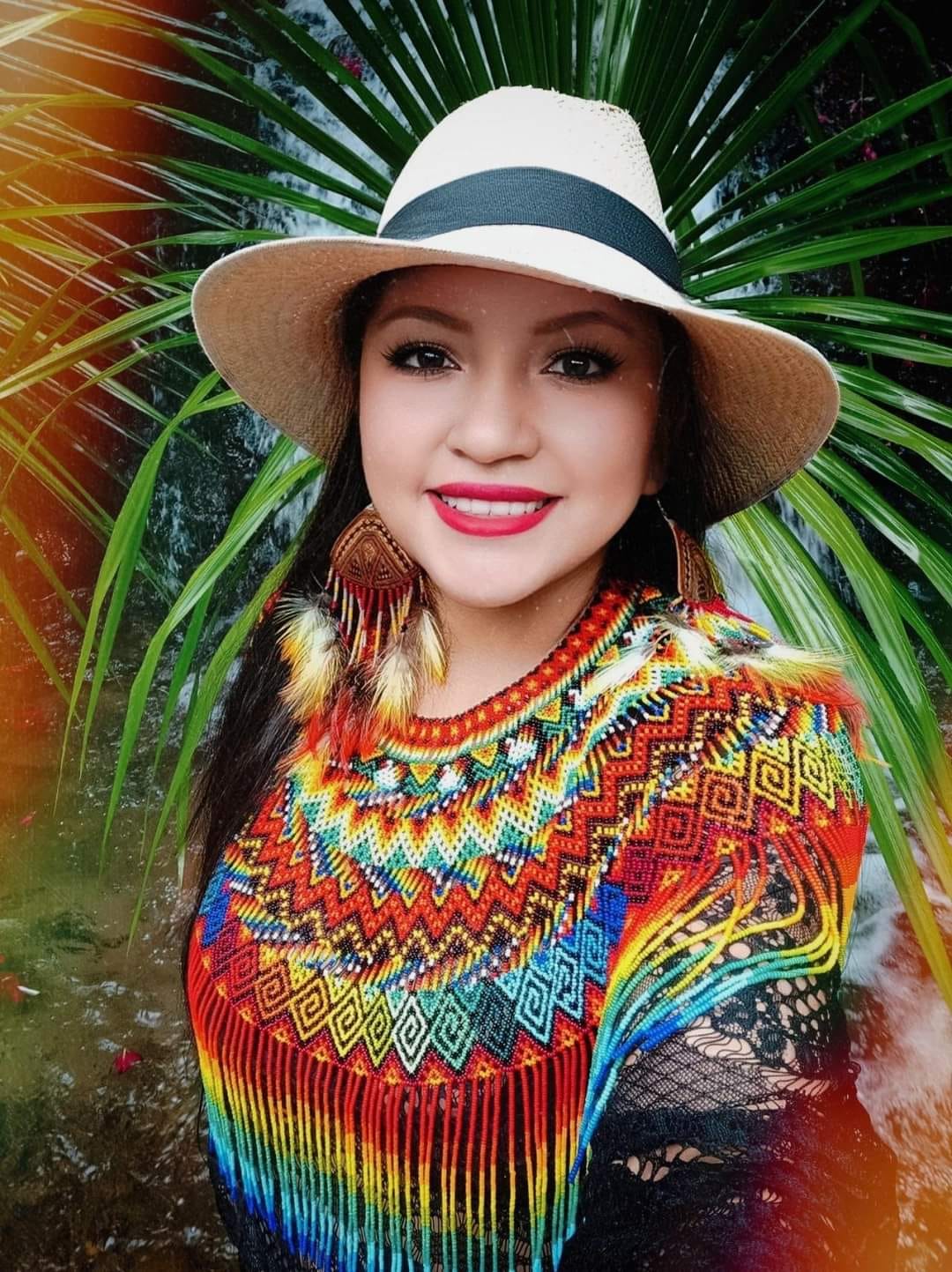
Estefania Grefa (Kichwa Amazonia) lives in the community of Union Base in the province of Pastaza, Ecuador. She has experience in tourism, environmental studies, ancestral gastronomy, and community social communication, and is a proud mother of two children. She grew up under the care and guidance of her grandparents, who shaped her cultural identity and passed down the wisdom and knowledge of her ancestors. She has dedicated her time to cultivating her skills in sustainable event decor using the Ungurahua palm and other plants that are found in the rainforest. Her endeavors promote the protection of the Amazon and conservation of the Ungurhua palm, which is at risk of becoming deforested. As part of her fellowship that was awarded in 2023, Grefa sought to strengthen and revive the traditional practices and cultural connections to the Ungurahua fruit through workshops on the nutritional benefits of the fruit, creating an ice cream that has become popular in her community.
Grefa says she is most inspired by her sister, Katty Guatatoca, who is also an advisor and mentor: “She motivated me to propose my idea in the support program of Cultural Survival. I also consider her a great woman activist for conservation and Indigenous bioeconomy alternatives who promotes the determination of cultural identity and self-esteem of our [Peoples]. From her, I have learned that there are no limits to achieve what we set out to do,” she says.
Grefa advocates for the protection of the Amazon Basin, one of the pristine rainforests at risk from ongoing deforestation and invasion from oil companies. She is one of many Indigenous women defending and safeguarding her remaining homeland, which she hopes to pass down to her daughters. As a young Indigenous leader in her community, she has inspired other Kichwa girls and young women to achieve their dreams as she did in building her own business while staying true to her cultural identity and the roots of her ancestor’s livelihood practices.
Being a young Indigenous woman overcoming the barriers of patriarchal hierarchy has not been easy in her community. “Today, being an Indigenous woman or having Indigenous roots implies the risk of discrimination, but also empowerment to continue the fight for the preservation of Indigenous cultures. In Ecuador, there is a recognition of a plurinational and multiethnic state, in which certain entities give value and generate opportunities for Indigenous women, in addition to the educational reforms that have generated the opportunity for studies. In my community, one of the challenges that persists is to fully allow the presidential leadership of a woman; there is still an underestimation of governance in the hands of a woman,” Grefa says.
Despite these barriers, there have been positive shifts through generations. “Today we talk about partners, life partners, both in families and in the community, and the high rate of domestic abuse has been reduced. Submission to men has changed to self-love and respect for the couple,” Grefa notes. Grefa is determined to continue promoting the love of her culture, passing the wisdom to her daughters.
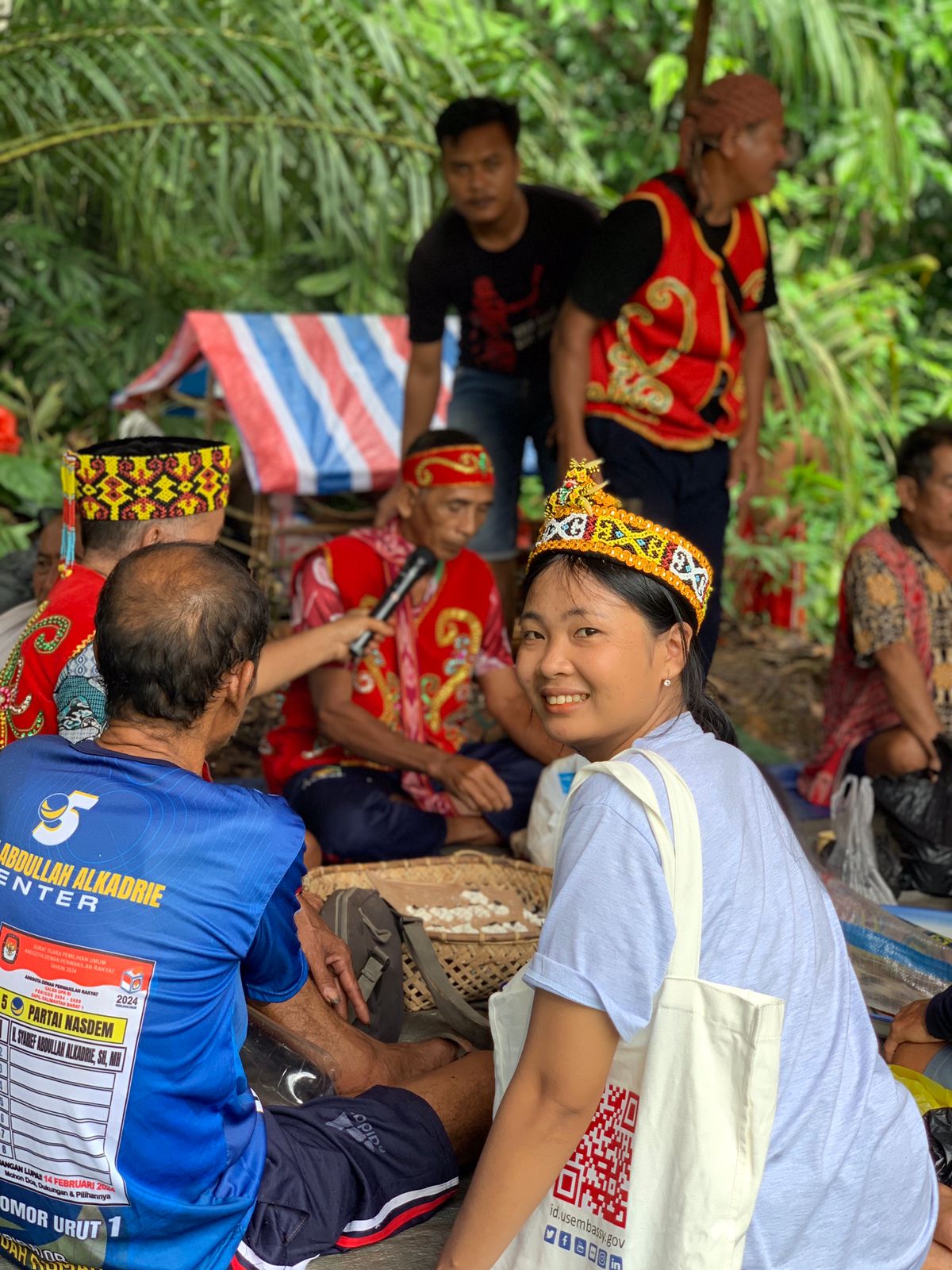
Florentina Sri Dewi Wulandar (Dayak Simpakng) was born in Tahak, Indonesia. Locally, she is known as Dewi, and her local name is Ragak, which means “she who weaves rattan baskets.” In 2021, Wulandar graduated from the Institute of Keguruan dan Ilmu Pendidikan Pontianak. She is a writer and uses her talent to bring to light the stories, knowledge, and wisdom of her Dayak culture and the Dayak people. Wulandar has also contributed to academic journals with articles on topics such as youth involvement in forest conservation efforts in Ketapang Regency and oral traditions of the Dayak Simpakng community in the management of the COVID-19 pandemic. She co-founded Arus Kualan, a traditional school for children and youth in the Dayak community, to learn about the traditional practices of and knowledge of the Dayak people and generate a sense of belonging among the young people who have become disconnected from their cultural roots and wisdom due to colonial influences.
Wulandar’s fellowship project is “Revitalizing the Dayak Simpakng Language Through Archiving Traditional Knowledge in Written Form.” Storytelling has been the foundation of traditional language transmission, and Wulandar pioneered this valuable communication thread. She is a leader in her community, inspiring other young women and youth to share their stories. Wulandar says, “A leader who has been an inspiration in my life is my grandmother, Anem. Although she has passed away, her figure remains a source of inspiration. My grandmother had extensive local knowledge about traditional medicines derived from the forest and was always generous in sharing her knowledge. She was often called upon to visit various homes to heal the sick with traditional remedies. Although my grandmother did not attend school, she equipped her descendants with Traditional Knowledge and encouraged them to continue formal education in schools. Being a contemporary Indigenous woman means living joyfully and aging while leaving a legacy for future generations. The challenges include not being bold enough to express opinions directly, educating children to continue preserving their local knowledge and identity, and ensuring that forests and nature are well maintained to provide for future generations. In my community, forests are crucial as they provide everything humans need and carry important messages for future generations.”
